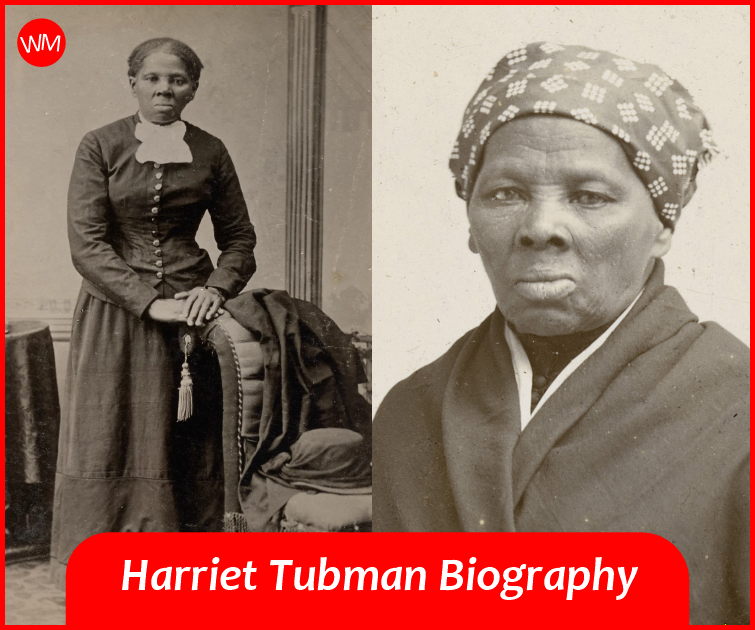
Harriet Tubman Biography – Harriet Tubman biography uncovers the heroic life of an abolitionist legend, detailing her net worth, courageous quotes, early struggles, accomplishments, and lasting impact.
Harriet Tubman stands as an enduring symbol of bravery and freedom, a woman who risked everything to liberate others from slavery. Known as the “Moses of her people,” Tubman’s life was a testament to resilience and compassion.
This Harriet Tubman biography explores every dimension of her remarkable story, her net worth, age during key events, inspiring quotes, early life hardships, limited education, Wikipedia-documented legacy, extraordinary accomplishments, family background, peaceful death, career achievements, and posthumous awards. Whether you’re drawn to history or tales of heroism, this in-depth look reveals why Tubman’s legacy continues to shine.
Harriet Tubman’s Biography
Harriet Tubman’s biography is a powerful saga of defiance and hope. Born into slavery around 1820 and passing away in 1913, Tubman escaped bondage to become a leading abolitionist and conductor on the Underground Railroad. Her life’s work not only freed hundreds of enslaved people but also inspired generations to fight for justice. In this article, we’ll journey through her life, uncovering the experiences and triumphs that made her an icon of liberty.
| Field | Details |
|---|---|
| Full Name | Araminta Ross (later known as Harriet Tubman) |
| Date of Birth | Circa March 1822 |
| Place of Birth | Dorchester County, Maryland, U.S. |
| Date of Death | March 10, 1913 |
| Place of Death | Auburn, New York, U.S. |
| Nationality | American |
| Occupation | Abolitionist, Underground Railroad Conductor, Civil War Scout and Spy, Nurse, Suffragist |
| Education | No formal education; illiterate throughout her life |
| Early Life | Born into slavery; suffered a traumatic head injury in childhood leading to lifelong health issues and visions |
| Escape from Slavery | Escaped slavery in 1849; subsequently made approximately 13 missions to rescue around 70 enslaved people, including family and friends, via the Underground Railroad |
| Civil War Service | Served as a nurse, cook, scout, and spy for the Union Army; notably led the Combahee River Raid in 1863, which liberated over 700 enslaved individuals |
| Post-War Activities | Advocated for women’s suffrage; established the Harriet Tubman Home for the Aged in Auburn, New York |
| Marriages | Married John Tubman in 1844 (a free Black man); later married Nelson Davis in 1869 (a Civil War veteran) |
| Children | Adopted one daughter, Gertie, with Nelson Davis |
| Net Worth | Lived in poverty for most of her life; despite her significant contributions, she received little financial compensation and relied on donations and the proceeds from a biography written by Sarah H. Bradford |
| Honors & Legacy | – First African American woman to appear on a U.S. postage stamp (1978)- Plans announced to feature her on the U.S. $20 bill- Numerous schools, museums, and parks named in her honor. |
Key Takeaways
- Tubman’s courage transformed the lives of countless enslaved individuals.
- Despite no formal education, her ingenuity was unparalleled.
- Her legacy spans abolition, military service, and civil rights advocacy.
Early Life: Born into Bondage
Harriet Tubman was born Araminta Ross around 1820 in Dorchester County, Maryland—her exact birthdate is uncertain due to slavery’s lack of records. The daughter of enslaved parents, Harriet Green and Benjamin Ross, she was one of nine children. From a young age, Tubman endured grueling labor and brutal treatment, including a severe head injury at 12 when an overseer’s weight struck her skull, causing lifelong seizures and visions she attributed to divine guidance.
Raised in a world of constant peril, Tubman’s early experiences forged her resolve. By her 20s, she married John Tubman, a free Black man, though her enslaved status remained unchanged, fueling her desire for freedom.
Education: Knowledge Through Survival
Tubman’s education was nonexistent in the formal sense—slavery denied her literacy. Yet, she developed an extraordinary intellect through observation and necessity. She memorized routes, learned survival skills, and mastered the art of navigation using the stars, skills critical to her Underground Railroad missions. Her lack of schooling never hindered her; instead, it highlighted her resourcefulness and determination.
Career Achievements: A Conductor of Freedom
The Underground Railroad
After escaping slavery in 1849, Tubman returned to the South 13 times over a decade, leading approximately 70 people—including family members—to freedom via the Underground Railroad. Her meticulous planning and fearless leadership earned her the nickname “Moses.”
Civil War Contributions
During the Civil War, Tubman served the Union as a nurse, scout, and spy. In 1863, she became the first woman to lead an armed military raid, guiding the Combahee River Raid that freed over 700 enslaved people. Her strategic brilliance bolstered the Union’s efforts.
Later Advocacy
Post-war, Tubman settled in Auburn, New York, where she supported freed slaves and championed women’s suffrage alongside figures like Susan B. Anthony. Her home later became a haven for the elderly and impoverished.
Net Worth: A Life Beyond Riches
Harriet Tubman’s net worth was negligible—she amassed no wealth, living frugally and often in poverty despite her heroism. Her earnings from odd jobs, a small Civil War pension (eventually granted), and donations were largely given to others or used to build a home for the needy. Her true wealth lay in her impact, not her finances.
Quotes: Voices of Valor
Tubman’s quotes reflect her grit and faith. Notable ones include: “I never ran my train off the track, and I never lost a passenger,” “If you hear the dogs, keep going. If you see the torches in the woods, keep going,” and “I had reasoned this out in my mind; there was one of two things I had a right to, liberty or death.”
These words, born from her experiences, inspire courage and perseverance.
Accomplishments: A Trailblazer’s Legacy
Tubman’s accomplishments are monumental. She liberated hundreds through the Underground Railroad, aided the Union war effort, and established a legacy of compassion with her Auburn home for the aged. Her advocacy extended to women’s rights, cementing her as a multifaceted champion of equality.
Parents and Family Life
Tubman’s parents, Harriet Green and Benjamin Ross, shaped her strength. She later freed them and several siblings via the Underground Railroad. After her first husband’s death, she married Nelson Davis, a Union veteran, in 1869, adopting a daughter, Gertie. Family remained her anchor amid relentless activism.
Death: A Peaceful Farewell
Harriet Tubman died on March 10, 1913, at approximately 93, in Auburn, New York, from pneumonia. Surrounded by friends and family, she passed with hymns and dignity, buried with military honors in Fort Hill Cemetery. Her death closed a chapter, but her spirit lived on.
Awards and Recognition
Tubman received little recognition in life, but posthumous honors abound. She’s featured on U.S. postage stamps (1978, 1995), has monuments in her name, and was slated to appear on the $20 bill. Harriet Tubman Day, celebrated March 10, and her Wikipedia page honor her as an American hero.
Conclusion
Harriet Tubman’s biography is a beacon of bravery and selflessness. From her enslaved beginnings to her final days, she defied odds to free others and uplift the oppressed. Her net worth was minimal, but her contributions were priceless, leaving an indelible mark on history as a liberator and humanitarian.
FAQs About Harriet Tubman
What was Harriet Tubman’s most famous quote?
She’s best known for saying, “I never ran my train off the track, and I never lost a passenger,” reflecting her Underground Railroad success.
Did Harriet Tubman have any formal education?
No, she was illiterate due to slavery but gained immense practical knowledge through experience.
What were Harriet Tubman’s major accomplishments?
She led hundreds to freedom, served as a Union spy, and supported suffrage and the needy in later life.
How did Harriet Tubman die?
She died of pneumonia on March 10, 1913, at around 93, in Auburn, New York.
What was Harriet Tubman’s net worth?
She had little personal wealth, living modestly and giving much of what she earned to others.





